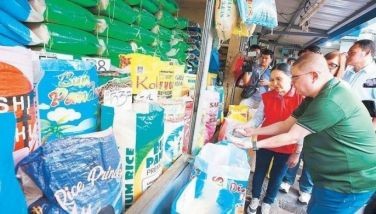China policy highlights country's fight to regain consumer confidence
BEIJING (AP) - China sought to shore up its battered reputation as a global exporter Friday, releasing a policy paper that touted its past food safety record and current campaign to crack down on poor _ and potentially dangerous _ food processing practices.
The policy paper, issued by the information office of the Cabinet, the State Council, lists a series of achievements and planned measures, from establishing a national food recall system to increasing exchanges with quality officials in other countries.
Though the 39-page document breaks little new ground, its release underscores the communist leadership's drive to salvage the "Made in China" label, which has been tarnished by months of quality scares.
"China is a responsible country," said the State Council Information Office paper titled "The Situation of China's Food Safety Quality."
"The Chinese government has stepped up active measures in enhancing food quality and ensuring food safety to protect the interests of consumers in both China and other countries," it said.
Chinese exports have been under fire, especially in the U.S., China's most important export market. Regulators have turned up tainted pet-food ingredients and seafood and toothpaste with potentially dangerous chemicals and drugs. Mattel Inc., the world's biggest toy company, issued its second recall of Chinese-made toys this summer because of lead-tainted paint and tiny magnets that could be swallowed by children.
While initially reluctant to acknowledge there was a problem _ a common position by officials at all levels _ authorities have since thrown themselves into the campaign to protect export industries and bolster the country's image for next year's Olympic Games in Beijing.
"China has not handled the crisis well so far, but its statements and actions show a desire for improvement," said Gene Grabowski, a senior vice president at a Washington-based public relations firm, Levick Strategic Communications, which works with big-name food and consumer goods companies.
In recent weeks, government leaders and agencies have almost daily announced stringent, severe measures to rectify the situation. The State Council last month took only one day to pass a new regulation on food safety mandating stronger supervision and hefty punishments for makers of dangerous goods _ unusually swift passage in a country where laws and regulations can languish for years. The policy paper released Friday was also put together with noteworthy haste.
Some of the companies involved in the U.S. recalls have been placed under investigation, been banned from exporting, had their business licenses revoked or been shut down.
In a rare news conference this week at the Chinese Embassy in Washington, trade officer Zhao Baoqing said his government was taking "resolute measures" and meting out fines and prison terms.
"The question is whether China can sustain these steps and manufacture and export products that meet global safety standards six months from now," said Grabowski said. "It has to show the world that it can make and manufacture products that the world deems as safe by global standards, from food to automobiles to children's toys."
According to the policy paper, China exported 24 million tons of food last year to more than 200 countries, 13 percent more than in the same period in 2005. Seafood, vegetables and canned goods and among the most popular products, while Japan, the United States and South Korea are the three biggest importers, it said.
"For years, over 99 per cent of China's food exports have been up to standard," the paper said.
It also said that an average of 89.2 percent of food products in the country's 31 provinces, autonomous regions and municipalities passed quality checks in the first six months of 2007.
"After much effort, the level of China's food quality on the whole is steadily rising, food safety conditions are improving nonstop and the order behind food production and sales is getting significantly better," it said.
The paper outlined measures to protect food quality including increased random inspections, widespread closures of unlicensed manufacturers and restaurants, large-scale seizures of substandard goods and implementing a national recall system. Few details were given.
The Chinese government will adopt tougher measures to guarantee that no substandard food is exported overseas by improving surveillance in all steps of the production process and blacklisting violators, the paper said.
But the paper also said that the problem was not China's alone and that international cooperation was key: "It is the international community's common responsibility to achieve food quality safety," it said, echoing Beijing's position that it is not the only one with problems.
On Sept. 12, a ministerial-level China-EU food and consumer products safety conference will be held in Beijing and a China-US food safety conference will be held in the United States through Sept. 11-12, it said.
"China is very aware of the potential risks to its status as a trading partner and as host of the 2008 Olympics, as it should be," Grabowski said. "Changing public perceptions is essential."
- Latest
- Trending
































